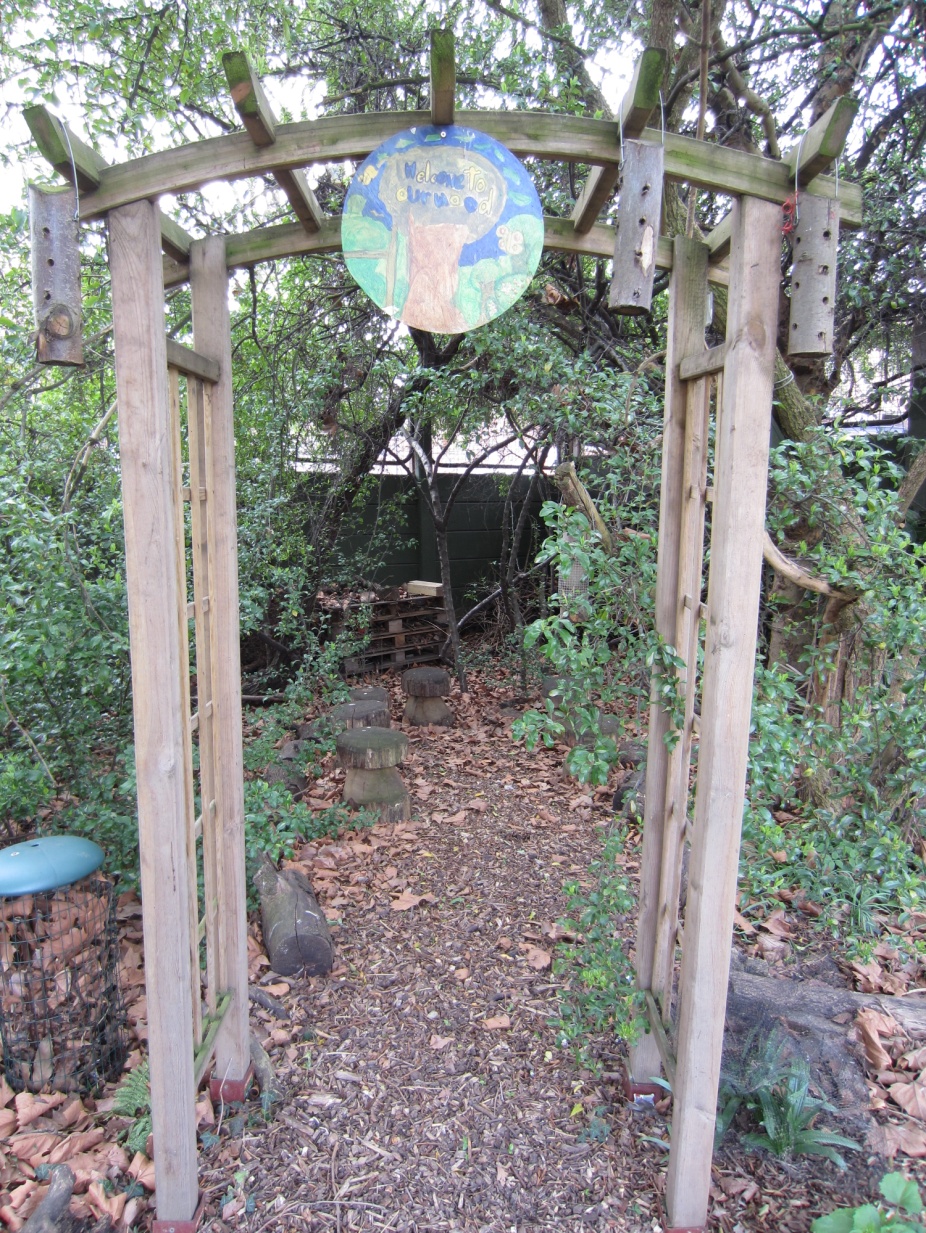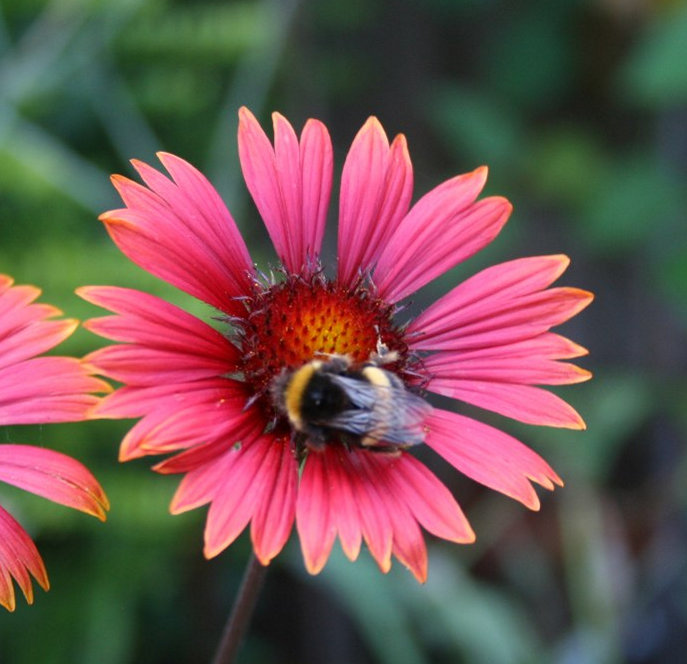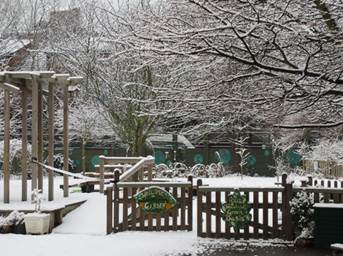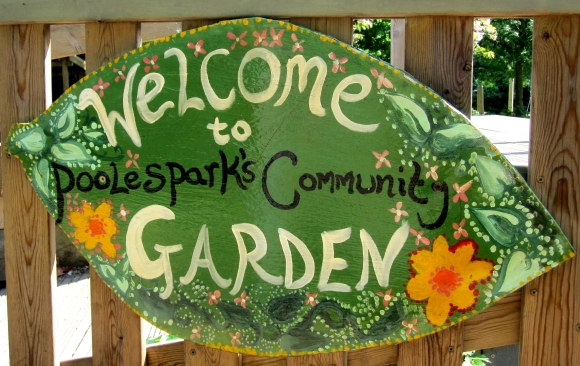- Home
- Public Benefits
- Gardening & people
- Education
- Case studies
- Pooles Park
The school's Headteacher Greg Crawford writes:
• Pooles Park School recognises the importance of contact with nature, for pupils, staff and visitors.
• At Pooles Park we raise awareness of biodiversity and sustainable practices to educate future generations.
• We look after our garden as a resource for local children and the wider community.
Our Environmental Education Project began with the vision that all children should have the opportunity to grow up connected with nature and learn through being outside in the natural environment; observing and caring for wildlife, sowing seeds, nurturing plants and watching them grow, eating the roots, leaves and fruits of the edible plants and understanding the importance of the rest.
Engaging inner city people in outdoor learning experiences for over 14 years, Pooles Park Primary School continues to provide regular and ongoing curriculum time, environment themed workshops for the children, nature themed workshops for our families and a variety of volunteering opportunities for the local and wider communities. All participants are able to go outside into our beautiful garden, interact with and learn about nature in a positive, productive and hands on way.
Case Study: Pooles Park School's Community Garden
By Sophia Ioannou
A Green Space for Wildlife and Us
Pooles Park Primary School is in Islington, London and has a strong vision for the importance of the natural environment in education.
Our adventure began in 2004 when we created a Global Food Garden and composting facilities in our grassed garden at the back of our school where we continue to grow a variety of global food from seed. Two years later, we successfully secured funding to section off another area of the garden, where a variety of wildlife friendly trees live, including Elder, Blackthorn and Hazel, to create a Wildlife Garden, with a beautiful wildlife pond and attached bog garden.
This garden space is truly a haven for wildlife, with a thriving, mature pond, native hedgerow around the periphery, wildflower meadows, native trees, native wildflower bulbs, insect hotels made from old palettes, log piles and stacks, rubble piles and leaf piles, dead hedges, bird feeders and boxes and both solitary and masonry bee houses.
Our green oasis, within a densely populated, urban environment, has been created with love, passion and enthusiasm by the children, staff, and families at our school. They have been helped by many volunteers from organisations including Capital Growth and Age UK, corporate volunteers who have their team building days at Pooles Park organised by The Big Alliance and Volunteering Matters, many teenagers through Orange Rock Corps, the Duke of Edinburgh programme and St Martins UAL, and local organisations including Groundwork and Islington Council, to name but a few.
Securing grants is vital in continuing to develop and maintain the garden as well as offer as much community engagement as possible and we are very grateful to all the funders who have, over the years, supported this beautiful and essential project.
We continue to source funding to develop, expand and evolve, and provide as much access as possible to, our Environmental Education project. Providing access to nature through this project has been, and remains, an important positive contributor to school life at Pooles Park – our garden is the BIG HEART of the school.
We have a 50 strong team of children - the Environment Team Monitors- who are committed and passionate about our project, keeping it maintained on a daily basis. They have important jobs such as: monitoring and recording wildlife in the garden, filling up bird feeders in the winter months, caring for the garden, collecting and composting food waste from KS1 classrooms, watering the greenhouse plants, caring for our hens and collecting their eggs and taking them to the school kitchen, collecting dead leaves/plants for composting, monitoring the compost area, monitoring the Global Food garden and harvesting produce – some is eaten fresh off the bush, some is taken home, some is sold to our families at a very low cost and some is utilised by the Cooking Club.
The benefits are profound. Children are growing up loving their natural environment and gardening. They are growing up with an inherent respect for their natural environment and realising, first hand, the inter-dependence that we have with our natural world. They are learning to love all the creatures that live in the garden and understand that worms are amazingly good for our soil and help our plants grow.
They now appreciate that bees are essential pollinators and we should not be scared of them, instead admire them for helping to grow our fruits and veg. They understand that positive action creates a positive reaction and have witnessed the garden flourish with wildlife through the creation of habitats and planting. They respect the important role of native flowers in providing nectar for our much needed insects.
Children have gained confidences and new skills in activities and essential life skills that, without this project, they would not have the opportunity to do.
Many adults have also had the same opportunities. Hundreds of volunteers from all backgrounds, ages and abilities have helped with this project over the years. All have been inspired and enjoyed their time at Pooles Park.
This project has been able to unite our wonderfully diverse community on a common theme - Gardening for Wildlife and Us. We have a great time in the garden, taking part in positive, productive hands on activities which benefit us, the natural environment and wildlife.
Generations of families have been and are still enjoying this project with the longer term impacts currently being explored by an undergraduate degree student from Kings College, who is researching the wider benefits that being part of a primary school project like this has on people’s lives.

The Pooles Park Environmental Education Project has been developed to benefit wildlife, the school community and the wider community.
It was identified as an important project for the whole school community because the majority of children that attend Pooles Park live on the two very large local council estates, without access to gardens or interactive green spaces.
This project provides our whole community with wonderful and unique opportunities to develop and enhance the school grounds for the benefit of wildlife and people, as well as watch and learn about all the wildlife that lives in and visits our mini green oasis.
Caring for our natural environment is an integral part of school life. The garden and all its features have a dedicated section of our website where you can find out more.


We have since continued to utilise areas of the school grounds and develop them for the benefit of wildlife, which in turn, benefits us. In particular our garden supports nature’s much needed pollinators such as bees and butterflies. We have created a Wildflower Circle which is outlined with a beautiful living willow fence and has a mixture of perennial and annual wildflowers growing inside it. Our 'River of Flowers', a meandering river shaped wildflower border, sponsored by the River of Flowers Organisation, contains many native bulbs and wildflowers.
The composting area serves as a habitat for a variety of creatures and an over wintering habitat for the many frogs which live in the garden, as does our greenhouse. Areas of long grass are left for the insects and birds, as well as areas where stinging nettles can thrive and provide insects with food and habitats.
There is a very mature hedgerow along the periphery of our garden provides shelter and food for many birds and insects who live in and visit our garden. The variety of trees includes Oak, Hawthorn, Willow, Wild Cherry, Crab Apple, Mountain Ash, Silver Birch and Field Maple. Our mini orchard when in flower provides pollinators with lots of nectar.
A bird box with a bird cam is home to Blue Tits, who have a least one family every year. This provides us all with hours of enjoyment each year – watching the eggs hatch and the baby birds grow until they fledge.
Our Cob Oven shelter/outdoor kitchen, has a green roof on it, providing wildlife with an elevated area of green space, food and habitats to replace the land taken underneath, as does the ‘Cabin’, our outdoor classroom, funded and built in 2012.
The Wildlife Project goes hand in hand with the school's organic, Global Food Growing Project. Gardens should be spaces for wildlife and people, no matter how big or small. The Wildlife Garden, adjacent to our Food Garden, provides a wonderful habitat for a variety of pond life and wildlife – flora and fauna, and in turn, this wildlife has helped us to successfully grow a variety of food each year, as the frogs manage the slug and snail populations and the pollinators come in to pollinate our food plants and provide us with bountiful crops each year.
Every year we lease out family food growing plots for families without gardens, and these also thrive with the essential help from the wildlife pollinators and pest managers.






We have since continued to utilise areas of the school grounds and develop them for the benefit of wildlife, which in turn, benefits us. In particular our garden supports nature’s much needed pollinators such as bees and butterflies. We have created a Wildflower Circle which is outlined with a beautiful living willow fence and has a mixture of perennial and annual wildflowers growing inside it. Our 'River of Flowers', a meandering river shaped wildflower border, sponsored by the River of Flowers Organisation, contains many native bulbs and wildflowers.
The composting area serves as a habitat for a variety of creatures and an over wintering habitat for the many frogs which live in the garden, as does our greenhouse. Areas of long grass are left for the insects and birds, as well as areas where stinging nettles can thrive and provide insects with food and habitats.
There is a very mature hedgerow along the periphery of our garden provides shelter and food for many birds and insects who live in and visit our garden. The variety of trees includes Oak, Hawthorn, Willow, Wild Cherry, Crab Apple, Mountain Ash, Silver Birch and Field Maple. Our mini orchard when in flower provides pollinators with lots of nectar.
A bird box with a bird cam is home to Blue Tits, who have a least one family every year. This provides us all with hours of enjoyment each year – watching the eggs hatch and the baby birds grow until they fledge.
Our Cob Oven shelter/outdoor kitchen, has a green roof on it, providing wildlife with an elevated area of green space, food and habitats to replace the land taken underneath, as does the ‘Cabin’, our outdoor classroom, funded and built in 2012.
The Wildlife Project goes hand in hand with the school's organic, Global Food Growing Project. Gardens should be spaces for wildlife and people, no matter how big or small. The Wildlife Garden, adjacent to our Food Garden, provides a wonderful habitat for a variety of pond life and wildlife – flora and fauna, and in turn, this wildlife has helped us to successfully grow a variety of food each year, as the frogs manage the slug and snail populations and the pollinators come in to pollinate our food plants and provide us with bountiful crops each year.
Every year we lease out family food growing plots for families without gardens, and these also thrive with the essential help from the wildlife pollinators and pest managers.
Our green oasis, within a densely populated, urban environment, has been created with love, passion and enthusiasm by the children, staff, and families at our school. They have been helped by many volunteers from organisations including Capital Growth and Age UK, corporate volunteers who have their team building days at Pooles Park organised by The Big Alliance and Volunteering Matters, many teenagers through Orange Rock Corps, the Duke of Edinburgh programme and St Martins UAL, and local organisations including Groundwork and Islington Council, to name but a few.
Securing grants is vital in continuing to develop and maintain the garden as well as offer as much community engagement as possible and we are very grateful to all the funders who have, over the years, supported this beautiful and essential project.
We continue to source funding to develop, expand and evolve, and provide as much access as possible to, our Environmental Education project. Providing access to nature through this project has been, and remains, an important positive contributor to school life at Pooles Park – our garden is the BIG HEART of the school.

The Pooles Park Environmental Education Project has been developed to benefit wildlife, the school community and the wider community.
It was identified as an important project for the whole school community because the majority of children that attend Pooles Park live on the two very large local council estates, without access to gardens or interactive green spaces.
This project provides our whole community with wonderful and unique opportunities to develop and enhance the school grounds for the benefit of wildlife and people, as well as watch and learn about all the wildlife that lives in and visits our mini green oasis.
Caring for our natural environment is an integral part of school life. The garden and all its features have a dedicated section of our website where you can find out more.
Our adventure began in 2004 when we created a Global Food Garden and composting facilities in our grassed garden at the back of our school where we continue to grow a variety of global food from seed. Two years later, we successfully secured funding to section off another area of the garden, where a variety of wildlife friendly trees live, including Elder, Blackthorn and Hazel, to create a Wildlife Garden, with a beautiful wildlife pond and attached bog garden.
This garden space is truly a haven for wildlife, with a thriving, mature pond, native hedgerow around the periphery, wildflower meadows, native trees, native wildflower bulbs, insect hotels made from old palettes, log piles and stacks, rubble piles and leaf piles, dead hedges, bird feeders and boxes and both solitary and masonry bee houses.
A Green Space for Wildlife and Us
Pooles Park Primary School is in Islington, London and has a strong vision for the importance of the natural environment in education.
Case Study: Pooles Park School Community Garden
By Sophia Ioannou

The school's Headteacher Greg Crawford writes:
• Pooles Park School recognises the importance of contact with nature, for pupils, staff and visitors.
• At Pooles Park we raise awareness of biodiversity and sustainable practices to educate future generations.
• We look after our garden as a resource for local children and the wider community.
Our Environmental Education Project began with the vision that all children should have the opportunity to grow up connected with nature and learn through being outside in the natural environment; observing and caring for wildlife, sowing seeds, nurturing plants and watching them grow, eating the roots, leaves and fruits of the edible plants and understanding the importance of the rest.
Engaging inner city people in outdoor learning experiences for over 14 years, Pooles Park Primary School continues to provide regular and ongoing curriculum time, environment themed workshops for the children, nature themed workshops for our families and a variety of volunteering opportunities for the local and wider communities. All participants are able to go outside into our beautiful garden, interact with and learn about nature in a positive, productive and hands on way.


We have a 50 strong team of children - the Environment Team Monitors- who are committed and passionate about our project, keeping it maintained on a daily basis. They have important jobs such as: monitoring and recording wildlife in the garden, filling up bird feeders in the winter months, caring for the garden, collecting and composting food waste from KS1 classrooms, watering the greenhouse plants, caring for our hens and collecting their eggs and taking them to the school kitchen, collecting dead leaves/plants for composting, monitoring the compost area, monitoring the Global Food garden and harvesting produce – some is eaten fresh off the bush, some is taken home, some is sold to our families at a very low cost and some is utilised by the Cooking Club.
The benefits are profound. Children are growing up loving their natural environment and gardening. They are growing up with an inherent respect for their natural environment and realising, first hand, the inter-dependence that we have with our natural world. They are learning to love all the creatures that live in the garden and understand that worms are amazingly good for our soil and help our plants grow.
They now appreciate that bees are essential pollinators and we should not be scared of them, instead admire them for helping to grow our fruits and veg. They understand that positive action creates a positive reaction and have witnessed the garden flourish with wildlife through the creation of habitats and planting. They respect the important role of native flowers in providing nectar for our much needed insects.
Children have gained confidences and new skills in activities and essential life skills that, without this project, they would not have the opportunity to do.
Many adults have also had the same opportunities. Hundreds of volunteers from all backgrounds, ages and abilities have helped with this project over the years. All have been inspired and enjoyed their time at Pooles Park.
This project has been able to unite our wonderfully diverse community on a common theme - Gardening for Wildlife and Us. We have a great time in the garden, taking part in positive, productive hands on activities which benefit us, the natural environment and wildlife.
Generations of families have been and are still enjoying this project with the longer term impacts currently being explored by an undergraduate degree student from Kings College, who is researching the wider benefits that being part of a primary school project like this has on people’s lives.












